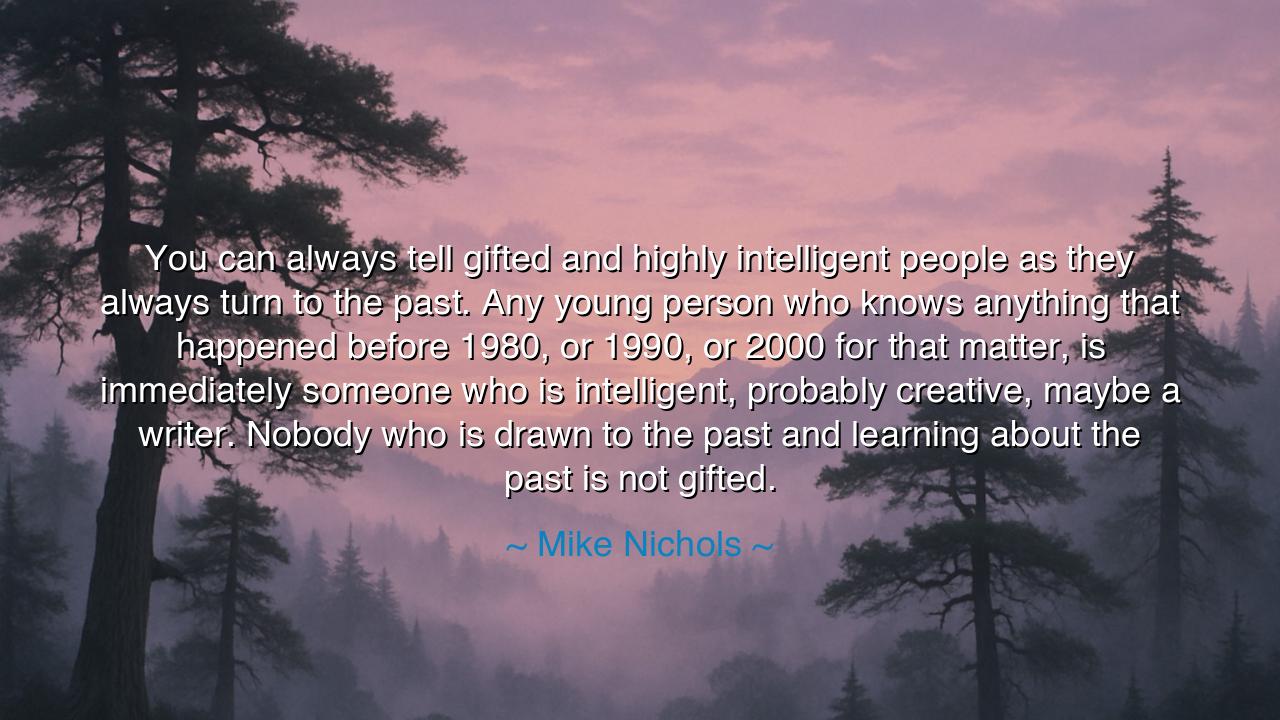
You can always tell gifted and highly intelligent people as they
You can always tell gifted and highly intelligent people as they always turn to the past. Any young person who knows anything that happened before 1980, or 1990, or 2000 for that matter, is immediately someone who is intelligent, probably creative, maybe a writer. Nobody who is drawn to the past and learning about the past is not gifted.






In the tapestry of thought and memory, Mike Nichols—a man of wit, art, and insight—once observed: “You can always tell gifted and highly intelligent people as they always turn to the past. Any young person who knows anything that happened before 1980, or 1990, or 2000 for that matter, is immediately someone who is intelligent, probably creative, maybe a writer. Nobody who is drawn to the past and learning about the past is not gifted.” His words are not merely a reflection on knowledge, but on depth of spirit—the idea that true intelligence hungers not for novelty alone, but for the wisdom of ages. The past, to the gifted mind, is not a relic, but a reservoir—a wellspring of meaning, where the roots of human experience nourish the present.
To turn to the past is to reject the illusion that all progress lies ahead. It is to understand that every idea, every creation, every civilization rests upon the bones of those who came before. The ancients knew this intimately. Greek philosophers revered their predecessors as masters of inquiry; Chinese sages honored the wisdom of their ancestors as the compass of all virtue. Those who forget the past, they warned, are condemned to drift without anchor, ignorant of the forces that shaped them. Nichols, in his own modern voice, echoes this ancient truth: that creativity and brilliance arise not from ignorance of history, but from communion with it.
Throughout history, the most gifted minds have indeed been those who sought counsel from centuries gone by. Leonardo da Vinci studied the anatomy of ancient sculptures to perfect his art. Shakespeare drew upon the myths of Greece and Rome to craft his timeless plays. Even the great innovators of science—Newton, Darwin, Einstein—were students of the wisdom that preceded them. To be drawn to the past is not to live in nostalgia, but to recognize the continuity of human thought—to see that knowledge is a river flowing through generations, each era adding its current to the stream.
Nichols also speaks to a cultural truth of our time: that many, especially the young, live surrounded by the immediacy of the present—the digital now, where memory fades beneath the noise of novelty. To know what came before, then, becomes an act of rebellion, an expression of depth and curiosity. A young person who studies the music of the 1960s, the philosophy of the Enlightenment, or the tragedies of ancient Athens shows not only curiosity, but consciousness—a desire to understand not just what is, but why it is. Such curiosity marks the writer, the thinker, the artist—those who seek not only to experience life, but to interpret it.
There is a sacred pattern here, one that the ancients revered: the cycle of remembrance. The wise do not discard the old in their pursuit of the new; they carry it with them, weaving its lessons into their own creation. Nichols’ admiration for those who look backward is thus an acknowledgment of humility—the understanding that intelligence is not invention ex nihilo, but the reinterpretation of inheritance. To create something meaningful, one must first understand the lineage from which meaning springs.
Consider the Renaissance, that glorious rebirth of art and reason. Its brilliance did not emerge from rebellion against the past, but from its rediscovery—the revival of Greek and Roman texts, the reawakening of forgotten philosophies. In remembering, humanity rose again. Likewise, every individual who looks to the past carries within them the same light of renewal, the same fire of learning, that turns memory into mastery.
The lesson is timeless: to learn from the past is not to be trapped by it, but to be liberated by understanding. Seek out the stories, the ideas, the triumphs and failures of those who came before you. Let their voices guide your imagination and temper your ambition. Read deeply, reflect humbly, and carry history within you as both teacher and mirror. For the one who studies the past walks through life not blind, but illuminated by the torches of countless generations.
Thus, Mike Nichols’ words stand as a quiet hymn to wisdom itself: “Nobody who is drawn to the past and learning about the past is not gifted.” To turn toward history is to turn toward humanity—to see beyond the flicker of one’s own moment and glimpse the eternal thread that binds all minds across time. In doing so, one joins the company of the gifted, the creative, and the wise—the ones who remember so that the world may move forward with understanding.






AAdministratorAdministrator
Welcome, honored guests. Please leave a comment, we will respond soon